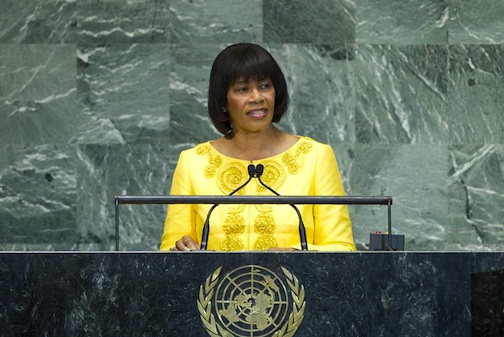Above: Jamaica Prime Minister Portia Simpson Miller (UN Photo/J Carrier)
By the Caribbean Journal staff
Jamaica Prime Minister Portia Simpson Miller addressed the United Nations General Assembly Thursday, urging the assembled states not to ignore middle-income countries like Jamaica on the development agenda.
“We urge that middle-income countries not be pushed to the margins of the development agenda, nor be put on the fringe of the development assistance provided by the international community,” Simpson Miller said. “We dare not forget that a significant proportion of the world’s poorest citizens live in Middle Income Countries — this is a diverse group which includes large developing economies and Small Island Developing States, such as those in the Caribbean.”
Simpson Miller’s call echoed that of Dominican Republic President Danilo Medina, who similarly pointed to the high rate of poverty in his country, despite higher levels of development by certain measures.
The Jamaican Prime Minister also urged support for countries like Jamaica in the fight for food security, a pressing problem in a region that is vulnerable to natural disasters and external shocks.
“Increasing food prices cause untold hardships for many of our people, particularly the most vulnerable in our societies,” she said. “Small countries need greater support to build resilience to economic and environmental shocks. I come to you today from such a nation.”
Simpson Miller also advocated for greater reforms in global economic governance, with an eye toward smaller economies.
“Jamaica is a nation small in size, but enormous in spirit — a nation with a people whose speed defies the laws of physics, whose musical messages have inspired positive and revolutionary global change and whose minds have provided the world with myriad solutions in areas including science, law and medicine,” she said. “Yet, many nations like Jamaica have such great possibility and potential that are not reflected in, or reflective of, its present economic indicators.”
